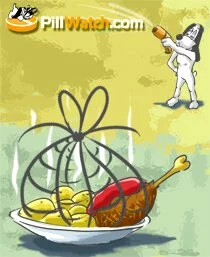
Almost one forth of the populations may have Irritable bowel syndrome (IBS) at some point in their lives. Then your muscles and nerves contract faster than normal (and you get the IBS with diarrhea as a dominant symptom) or slower than normal (with constipation as a symptom). In addition you begin to suffer from gas, cramping and stomach pain. In long term IBS can cause a number of new painful symptoms, such as hemorrhoids.
IBS-C is a type of the disease where dominant symptom is constipation. It can last rather long period of time, from several days to months, which is very exhausting. Stools are hard, often in the shape of balls; the person doesn’t feel empty after it. That may cause him or her using laxatives or sitting on the toilet more time that is needed.
As some food may aggravate the symptoms of IBS you should try to minimize the consumption of that kind of food. Some changes in your diet include less consumption of lactose (in milk, ice cream, yogurt, cheese) and of foods causing gas (beans, cabbage, broccoli, cauliflower). You are advised to eat more products that contain dietary fiber. As an average person consumes only half of the recommended dose of it with products you should probably make your own diet plan with your doctor.
Diet high in natural fiber can sure make your health better and minimize the development of many health problems, including IBS (because they regulate healthy bowel movements and reduce the pain associated with hemorrhoids). It is present in such products as grains, pasta, cereal, nuts, legumes, seeds, some vegetables and fruits with peels. These products contain either soluble or insoluble (natural laxative) fiber. Psyllium appeared to be especially effective in case of constipation.
Though, natural fiber may irritate the digestive tract because of the existed irritation. That is the reason that your doctor may also suggest you to take dietary fiber supplements, depending on the symptoms of IBS. You are more likely to be advised taking supplements or increasing natural fiber consumption in case you have CD or UC with constipation as a dominant symptom. Very often supplements are proscribed as it turns to be rather difficult to consume enough fiber in the diet (as in case with bulk-forming natural fiber).
Commercial bulk-forming supplements can provide synthetic or natural fiber. Psyllium (psyllium seed husks) is a natural dietary fiber that helps to make stool softer and thus easier to pass. Metamucil is one of the commercial brands of psyllium manufactured by Procter and Gamble. As a natural laxative it relieves the constipation in people with IBS by increasing the amount of water in the stool (though may be used for other symptoms or health problems).
- Let your doctor determine the dose (it depends on your age, medical condition, and in some time even on response to treatment)
- Start at the lowest dose and gradually increase it (in several weeks) to avoid problems with gas
- Do not take your supplements together with medications, as it may delay its absorption (take it several hours before or after)
- Always drink a full glass of water while taking a fiber
- Continue to drink water throughout a day (to ease constipation)

- Use Metamucil for period of time prescribed by your doctor (not longer as it may be habit-forming)
- Do not forget about water consumption
- Take it regularly
- Let you doctor know whether the symptoms has improved or other symptoms occur (allergy with rush or trouble swallowing, nausea, vomiting, stomach pain, rectal bleeding, etc.)
- Talk to your doctor in case constipation doesn’t improve in 7 days
Metamucil is available on the market in capsules, powder and wafers. Its powdered drink mixes are especially popular. It is sold in different quantities, with or without sugar, in different flavors – berry, orange, pink lemonade, etc. It is simple in using and brings essential relief in people suffering from constipation.
Valentyna Ant.
| Tip for you : Sign-in with Your OpenID and post faster, easier and with easy access to all your past posts. | |
|
Your Nick: |
















